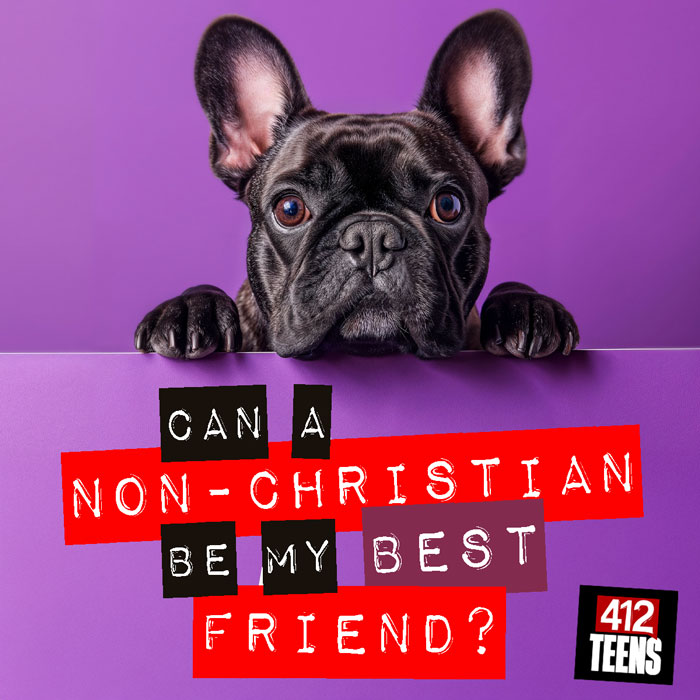Is it OK to be best friends with a non-Christian?

Have you ever noticed that your inner circle of friends kind of act like each other in some ways? When it comes to friendships, it's a common belief that we become who we spend time with the most. If we hang out with gossipers, then we're more likely to gossip. If we hang out with helpers, then we're more likely to also be a helper. If we hang out with bullies, then we're more likely to get into the bullying mindset.
Biologically speaking, our interactions with our closest friends will influence the neuropathways that form in our brains. Every experience, late night chat, confrontation, or adventure will imprint on who we are as we grow and develop as individuals. Spiritually speaking, this means that when we become best friends with an unbeliever who disregards God, rejects Jesus, or leads a lifestyle defined by sin, we are more likely to mirror their behavior in our own lives (1 Corinthians 15:33).

The Bible says that there are those who are still enslaved by Satan's temptations and those who are children of God (John 8:34; Galatians 5:1). Because of this fundamental difference between a believer and an unbeliever's identity, we must be extra wise about our "best friend" relationships.
"The righteous should choose his friends carefully, for the way of the wicked leads them astray." —Proverbs 12:26
Friend Group Red Flags
We are called to model our lives after Jesus, who was a friend to sinners (Luke 7:34). So there's nothing inherently wrong with being friends with unbelievers In Matthew 28:19-20, we are called to make "disciples of all nations." This often involves building friendships with people who don't know or follow God. And that's OK!
But at the same time, we cannot abide by "friends" who are negative influences on our lives—such as encouraging us to sin (1 Corinthians 5:9-1), corrupting our morals (1 Corinthians 15:33), being foolish instead of wise (Proverbs 13:20, 14:7), living a sexually immoral life, being jealous, gaslighting, or even having a short temper (Proverbs 22:24). These kinds of friendships can take a toll on us—not only spiritually but also mentally and emotionally.
"Whoever walks with the wise becomes wise, but the companion of fools will suffer harm." —Proverbs 13:20

Friend Group Green Flags
When it came to His closest friends, Jesus only kept a small circle. These were like-minded men and women who stayed close to Him, whom He loved dearly and called His friends (John 15:15; Mark 3:13-19). Even among Jesus' twelve disciples, His closest friends were Peter, James, and John. If we're modeling our life after Jesus, our best friends should not be unbelievers. Jesus was selective and wise about choosing His closest friends, and we should be too.
Like Jesus, we (and our close friends) should let our "good deeds shine out for all to see" so that those around us will praise our Heavenly Father (Matthew 5:16). Our closest friends should be the sort of people who look for opportunities to be kind, forgiving, and compassionate to both friends and neighbors (Romans 13:10; Colossians 3:12). They ought to seek to share the gospel through their words and actions (Matthew 22:37-40). Good friends will encourage your spiritual growth and support your personal convictions (Proverbs 27:17).

Why All This Matters
The Bible says we must avoid becoming close friends with wicked people (Proverbs 1:10-19; 4:14-19) or those who would lead us into ungodliness (Proverbs 12:26). The Apostle Paul talks about this in one of his letters to the Corinthian church: "Don't team up with those who are unbelievers. How can righteousness be a partner with wickedness? How can light live with darkness?" (2 Corinthians 6:14 NLT). This applies to any kind of intimate relationship—such as business partners, dating, marriage, and, yes, best friends too. It's hard to live well and righteously when those closest to you are walking a different path .
"Enter by the narrow gate. For the gate is wide and the way is easy that leads to destruction, and those who enter by it are many. For the gate is narrow and the way is hard that leads to life, and those who find it are few." —Matthew 7:13-14
If we have an unbelieving friend who consistently indulges in sin, we should pray for them and love them, but they are not someone we should choose as a best friend. We never want to become complacent about sin in our own lives (Ephesians 6:10-18), and since our best friends shape our brains and our behavior, we need to prioritize wisely. Ask God for wisdom about which friends are good choices for your inner circle (James 1:5).
"Be sober-minded; be watchful. Your adversary the devil prowls around like a roaring lion, seeking someone to devour." —1 Peter 5:8
Being a Light to the World
Many unbelievers have come to accept Christ as their Savior through God's grace along with the prayers and friendship of Christ followers. So there's no reason to hide from unbelievers. We are called to share our faith, yes, and we are ALSO called to be vigilant about our own spiritual journey—protecting our hearts and minds from the things that get in the way of our relationship with God. We can be kind, share the love of Jesus, and teach them about the gospel. Extending quality friendship is just one way to bring God's light into the darkness of those who don't know Him.
"In your hearts honor Christ the Lord as holy, always being prepared to make a defense to anyone who asks you for a reason for the hope that is in you; yet do it with gentleness and respect..." —1 Peter 3:15
ALSO SEE:
- What is true friendship?
- ISO: BFF
- Can I be friends with non-Christians?
- Are non-Christian friends "bad company"?
- Why can't I date or marry an unbeliever?
- What does it mean to be "in the world, but not of the world"?
- When Friends Reject Your Faith
- What does the Bible say about dealing with toxic relationships?
- How can I stop being a people pleaser?
- What are some signs of spiritual abuse?
- What is gaslighting?
- How do I get my friend to accept Christ?


TL;DR
When it comes to friendships, it's a common belief that we become who we spend time with the most. Our closest friends should be the sort of people who look for opportunities to be kind, forgiving, and compassionate to both friends and neighbors (Romans 13:10; Colossians 3:12). They ought to seek to share the gospel through their words and actions (Matthew 22:37-40). We don't have to withhold friendship from unbelievers, as we are called to be a light in the darkness (Matthew 5:16). But we're ALSO called to be vigilant about our own spiritual journey—protecting our hearts and minds from the things that get in the way of our relationship with God. When it comes to our BEST friends, we should follow Jesus' approach in developing an inner circle of friends who encourage our spiritual growth and support our personal convictions (Proverbs 27:17)—and for whom we can do the same.

Writer: Grace Murphy
Grace is a passionate writer and musician who desires to radiate Christ's light in a generation of teens and young adults navigating their life in a world of spiritual darkness. Recent founder of Christian rock band Lighthouse Saints, she desires to spread the message of God’s truth and love through her songwriting and voice! Grace is also an aspiring freelancer who has worked professionally in writing, editing, and social media content creation. In her free time, Grace enjoys meeting new people, reading lots of books, jamming out with her friends, and writing (sometimes overly dramatic) poetry.
